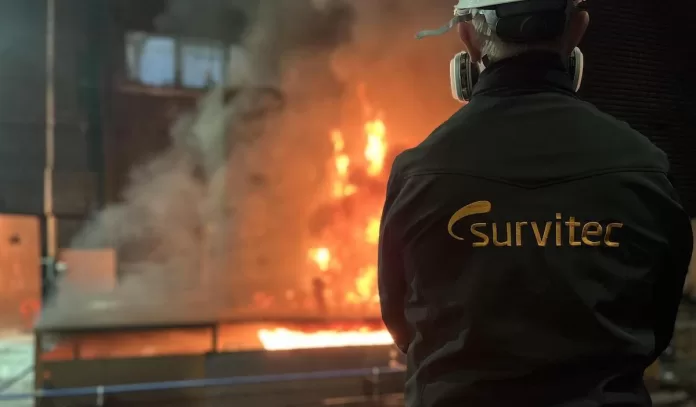Existing fire-fighting methods are inadequate when dealing with methanol-based fires on board vessels.
That’s the finding of a fire safety study by survival technology solutions provider Survitec.
The study included comparative fire tests on dual-fuel marine engines using diesel oil and methanol, carried out amid growing interest in methanol as an alternative marine fuel.
“Our tests confirm that traditional water mist fire suppression mechanisms do not perform as expected on methanol pool fires and methanol spray fires,” said Michal Sadzynski, product manager, Water Mist Systems, Survitec.
“A completely different approach is required if these ships are to remain safe,”
And he explained that methanol is a methyl alcohol (CH3OH) that burns in a completely different way to hydrocarbon fuels and has a much lower flashpoint of 12°C (54°F).
While there are established fire safety regulations and testing standards for diesel fuels, clear test protocols for alcohol-based fuels such as methanol and ethanol have yet to be developed.
High-risk situation
“We believe this is a high-risk situation that needs immediate action,” added Michal. “Methanol fires are far more aggressive than fires involving traditional hydrocarbon fuels.
“Methanol fires have different physicochemical properties and so they cannot be extinguished as easily or with the same approach.”
The Survitec tests found that while water mist systems are highly effective in absorbing heat and displacing oxygen on diesel fires, they do not produce the same results on methanol fires.
“We had to completely rethink nozzle placement, spacing and other factors to make water mist suppression effective on methanol,” explained Michal. “For instance, the range for nozzle installation height is much lower than that needed to put out a diesel fire.”
And Maciej Niescioruk, product manager, Foam Systems, Survitec, called on the industry to come together to develop comprehensive and robust fire test standards and safety rules tailored to methanol’s unique properties.
“We encourage all stakeholders to come together to address methanol’s unique fire risks and create clear standards, new testing protocols and updated safety rules for methanol,” he said.




